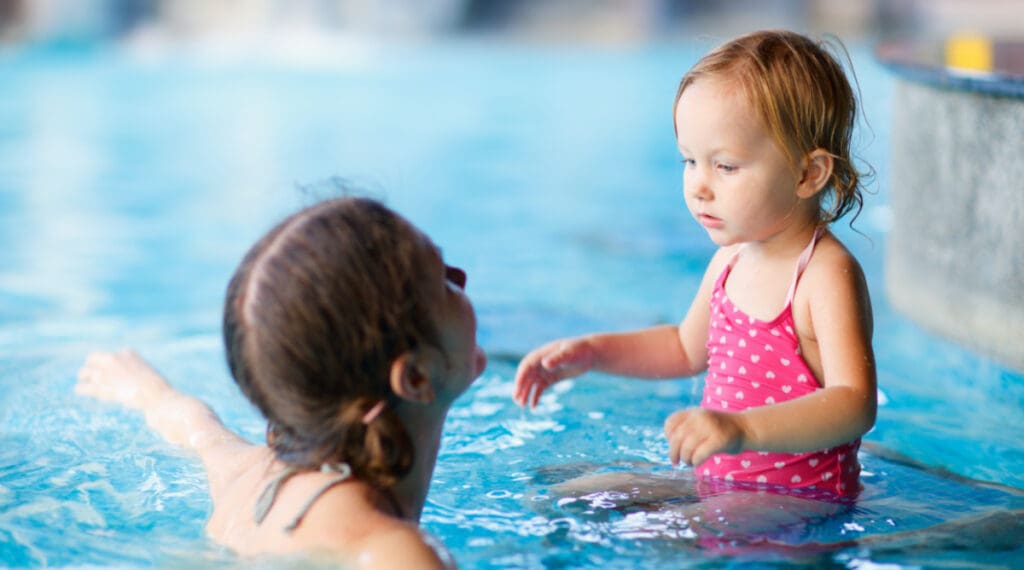It happened so quickly that I didn’t have to time to be afraid. It was so sudden that there wasn’t even time for her grandparents, watching from the balcony above, to cry out.
We had been swimming—or more accurately, Zippy had. The pool water was frigid—it wasn’t heated even in summer, and the calendar was nearing October. So I had bowed out early, to sit on the side, watching in the warm sun all covered up while she swam about happily, her floaties keeping her aloft.
She was finally finished and out of the pool, her floaties removed. I was spreading out a towel on the chair for her to come and warm herself. My back was turned just for an instant.
There was a splash, and I turned to see her, sinking like a stone in the deep end of the pool. Instantly, I too was in the water, and I pulled her out gasping.
Zippy was delighted. “Aunt Grace saved me!” she proclaimed proudly.
I did not share her enthusiasm. The adrenaline that hadn’t had time to course through my veins surged on repeat, each time I thought about what a close call we had.
And so it was that I decided that it was time for her to learn to swim “for real,” without floaties. To be ready for “just in case” moments like that, to be able to at least get to safety before sinking.
But even the shallow end of the pool was too deep for her to walk in—it was just above mouth level. So even to begin I had to get in the pool with her, to hold her, to keep her always within inches of me.
She was again delighted. “Let’s go in the pool without my floaties!” she cried out the next morning, even before breakfast, with the outside temperature only in the low 50s. Again, she was alone in her enthusiasm.
But that night in my healing ministry class, we were invited to ask God in prayer to show us how He was empowering us for ministry. The image He gave me was of floaties. Only it was clear that He wasn’t putting them on me, He was taking them away.
I’ve often had the sense of being called “into the deep.” But at this point more than ever I saw that I could not go alone: to swim safely in the deep, I had to remain in the arms of the Father.
I wonder if we often imagine being carried as being coddled. But what if we are being brought further out into places where human strength is insufficient? What if we are deliberately being brought into depths over our head? What if, in that moment, we are being strengthened and equipped to do what is only divine?
Healing ministry is based on prayer, not on our power. I can’t heal. I can’t enter your heart; I can’t take away your pain, break your chains, fill you with peace. But God can do all that.
We have heard so many times about Peter wanting to walk on water. How he called to Jesus, “Let me come to you across the sea!” How he stepped out of the boat, and onto the waves. We recall how, seeing the surge, his faith faltered, and he began to sink. And in an instant, Jesus reached out and brought Him to safety.
How close Jesus must have been to reach out that quickly to stop him from drowning! But I think He was closer even than that.
What inspired Peter to even ask to walk on water? Really, what was he thinking?
We sometimes think of Peter as brash, reckless, a little hot-headed and hasty perhaps. But what if his desire was actually God’s? What if he was inspired to ask for what Jesus already wanted to give?
Human beings cannot walk on water. But for just a moment, Peter did.
Unlike me, God is not cowed by the cold, not afraid of the dark or the storms or the surge of the sea. “The waves and winds still know His name.” He is never far from us. We are never, even for a moment, beyond reach of His saving power. He never tires of rescuing us.
But nor is He afraid of human weakness.
Rather, He so loved us in our weakness that He wedded Himself to that weakness in the Incarnation—the Son of God became true Man. A divine person, He nonetheless has two natures: He is one hundred percent God, and one hundred percent man. He doesn’t lose any divinity in becoming man. But more impressive—Jesus allows His humanity to be anointed by the Holy Spirit. Even His human nature is thus empowered to do the divine. And when this same Holy Spirit comes upon the disciples at Pentecost, they too—while still only human—are equipped to do what is only divine.
In Father Paul Scalia’s book, That Nothing Might Be Lost, he comments on the image of the Holy Spirit as the breath of God. Yet how close one has to be, to feel the breath of another upon us!
To breathe on someone requires being close. To give the Spirit Jesus had to be close to the Apostles, right next to them. He was in their “personal space”, because His gift was intensely personal. Breath, after all, come from within.It indicates the interior life of a person. In bestowing the Spirit, Jesus gives an intimate gift. The Spirit is not a gift external to Him but proceeding from deep within Him…
…A gift ought to be received in the manner it is given. As regards the gift of the Spirit, this means drawing close to Jesus. We need to be up close and personal, next to His face, feeling His breath upon us.
God delights in rescuing us. But He is even more pleased when we trust Him to take us to the places beyond our security and self-sufficiency—places we can only go with Him. While my swimming lessons with Zippy tried to make her independent, to equip her to swim alone, God’s lessons in the deep teach and equip us with power that can only come from radical trust and dependence on Him—of the human and divine so close that they are truly united.
Image credit: Depositphotos




